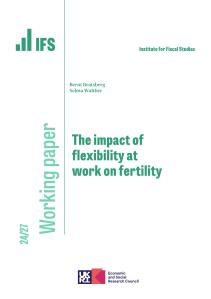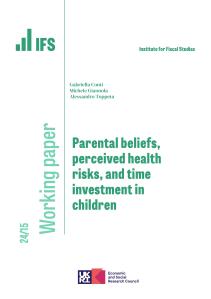
We look at the future for young people in the jobs market and how they were affected by the pandemic.
Paul Johnson
Hello, and welcome to the IFS Zooms In. I'm Paul Johnson, director of the Institute for Fiscal Studies, and today we're going to talk about how young people who left school and university during the COVID pandemic are faring in the jobs market. I'm joined by Xiaowei Xu, who's a senior economist here at the IFS, and by Sarah O'Connor, employment columnist at the Financial Times.
Now we all know that generally, during recessions, young people fare really pretty badly in the labour market, and that often leads to many years of falling behind cohorts who didn't graduate into economic downturns. There's been a lot of concern about young people over the last several years as they've moved into work, started working online during the pandemic, actually struggled to move into work as jobs weren't available. So, we're going to talk about how that has or hasn't impacted them in the couple of years since the pandemic.
And Xiaowei, you've been doing some work very specifically on that, and I think one of the fairly clear conclusions of that work is that, so far as we can tell so far, young people who did graduate into the pandemic haven't had much in the way of long term effects on their occupation, wages, employment.
Xiaowei Xu
Yes, that's right. So, if you look at the cohorts that graduated into the pandemic one year into their careers, you don't see that they have lower employment rates, or poorer job quality, across a number of job quality measures, than the cohorts who graduated before the pandemic. I think that's quite a surprising finding, but I think in short it's because of the rapid economic recovery we've seen, and the boom in job vacancies that we've seen since the pandemic. So, at the start of the pandemic, many people, myself included, thought that this pandemic would be particularly bad for young people, would lead particularly bad scarring, and that's because this unprecedented collapse in job vacancies, the fact that young people disproportionately worked in sectors that were shut down, and the fact that the deterioration in mental health we saw was most severe among young people.
And actually, if you look at the cohort of young people who graduated in 2020, we did see worse outcomes immediately after graduating. So, three to six months after they graduated, they were around ten percentage points less likely to be employed than the cohort who graduated a year earlier, but then we saw this rapid rebound in vacancies over 2020 when restrictions were lifted, and then by spring 2021 vacancies were actually running above pre pandemic levels, so they caught up very quickly and that didn't seem to have long term effects.
Paul Johnson
Which is great, and I think perhaps too often we focus on the bad news, and you know we have got inflation and we have got living standards across the board falling over the last couple of years, but I think in some ways if you told us you know the height of the pandemic when we've been locked down for months, that this is where we'd end up with no unemployment, essentially, young people not doing too badly in the labour market, cost of living problem, but a very shared cost of living problem, I think we might have taken that, I mean it's not such a bad outcome, given the possibilities of mass unemployment that I think a lot of us were concerned about. So, some cheery news, unusually from the IFS Zooms In.
But Sarah, it's not just about whether people are in work or exactly what they're earning, of course. Young people have started work with social distancing on Zoom, not necessarily in the workplace quite as much as they otherwise would have been, we have all heard of or experienced Zoom fatigue, and we know that there's some issues around mental health. So, what do we know about young people's experiences in the workplace over the last two or three years?
Sarah O’Connor
This is all qualitative, but I think we know that young people you know struggled I think more than any other demographic with the fact that a lot of work, at least white collar - let's be clear we’re talking about white collar work here - moved online. You know, I think, I spoke to a lot of young people at the time of the lockdowns who were beginning you know their first sort of graduate traineeship, and they were just missing out on everything that makes that fun. You know they weren't meeting their colleagues in person, they weren't going to the pub, they weren't generating any of that kind of social capital and know how about how the organisation works, who's who, who do you go to with a problem. You know they were just sort of sitting, often in their parents’ bedrooms because a lot of people ended up staying at home rather than moving out for obvious, you know sensible financial reasons, but I think it felt, you know this moment that should have felt like the moment of growing up, really didn't feel like that. And I know, you know, line managers also felt that it was harder to train young people, and that they wouldn't necessarily ask as many questions. I remember talking to one guy who worked at a big consultancy and he was saying that, you know, normally after a big training session, a lot of the questions would come after the training session finished, you know, over the biscuits and someone would sidle up and say, “actually I didn't quite understand that, can you explain it.” And you just don't get that ability when you're hosting a big Zoom. And so, I think you know for some young people that was a struggle and certainly a lot of young people in our office were the ones who were most keen to get back in in person as soon as they could.
That said, I think there were some young people who kind of, maybe got used to the idea of doing things remotely, maybe are more comfortable generally being behind a screen and chatting, you know, over G-Chat or whatever, rather than in person. So, I've also spoke to some managers who said they've actually struggled to get some of their young people to show up, so I think it's a bit of a mixed picture. But definitely like a hugely different introduction to the world of work than previous generations.
Paul Johnson
Yeah, and it's been very striking, hasn't it, how differently different people have approached this, I'm a slightly older generation than that and a lot of my friends loved working at home, personally, I absolutely hated it because I kind of realised that I quite like people, and interacting with people and it worries me when you see that that's not happening.
But do we know more about how that's developed over the last year or so? I mean have firms insisted on bringing their young people in? Have, I mean, are they getting trained in person now, or is there still a difference in the experience of this cohort of young people to those three or four years ago?
Sarah O’Connor
I think there's still a difference in the sense that most employers have sort of settled on a hybrid model, right? So, I don't think many people are in five days a week, and so you know, maybe they're not getting quite as much face-to-face time as they used to get, but in many ways I think things have normalised, and I know a lot of employers tried to do some sort of catch up stuff for their younger people. I mean, you're an employer of quite a lot of young economists, I don't know how you think that that cohort is faring?
Paul Johnson
We should possibly ask Xiaowei because he's considerably younger than I am. But I mean my - I suppose the one thing that's slightly worries me is that because people have got used to attending sort of conferences and seminars and presentations online, they're just not making the external networks that they would have done. I mean when I started work, you know I'd be going to quite a lot of meetings, and seminars, and meeting the civil servants, and the journalists and the so on in person. I slightly worry that it's become so easy to do that online that people are taking the as it were the, you can see why today it's easier to spend an hour in a desk rather than you know two hours travelling. But I think there's potentially a long-term loss there. But what's your sense Xiaowei?
Xiaowei Xu
Yeah, I think that's definitely right. It also makes, you know, giving seminars, roundtables, workshops much less fun doing things online and not having the chance to chat to people around the sessions and afterwards. And they do think that, probably, possibilities for collaboration then get lost because you don't have those side chats afterwards.
Paul Johnson
It's potentially, we don't quite know what's going to happen to the economy over the next couple of years, but it looks like the labour market is tightening - sorry, loosening a little bit in the sense that we've got this extraordinary position where we've got very low levels of unemployment at the moment, and this is really helping young people, but we might expect that to get a little bit harder over the next couple of years in terms of finding work. As we've said the COVID experience is very different from your standard recession, but if we do go into some kind of recession, might we start to worry again about what the long-term effects might be? I mean, what do we know, Xiaowei about How previous recessions in particular have affected young people?
Xiaowei Xu
So, we know from previous recessions that graduating into a recession tends to have lasting effects with several years after graduating. And that's because young people don't get the work experience, they need to progress, they can end up in jobs that are less well suited to them, which can then damage their long term career trajectories. We know that youth unemployment tends to be more cyclical than unemployment among older people, both because young people tend to work in sectors that are themselves more cyclical, like hospitality, and because young people have less experience, so firms tend to stop hiring young people when times are tough, and they're more likely to let them go. But I think you know when it comes to the coming recession, I think, as you say, the key thing is what happens to labour market tightness, and if we do see vacancies start to fall significantly and unemployment rise, then perhaps we can expect the scarring effects that we normally see in recessions.
You know, as you say, there is evidence that the labour market is starting to cool, we see vacancies falling, especially in the private sector, but in terms of levels, the labour market is still very, very tight, there's still many, many more vacancies than before the pandemic, and unemployment is still very low. It's partly because of the early retirements we've seen over the pandemic, and the loss of migrants after Brexit. So, I think it is possible because of these factors that the labour market will remain tight for some time to come, in which case perhaps young people wouldn't be as badly affected as in previous recessions.
Paul Johnson
And Sarah from talking, I mean your work, you talked to lots of employers and so on, I mean, what's your sense of what's happening in the labour market at the moment?
Sarah O’Connor
It feels like we've sort of reached the tipping point a bit, doesn't it? I mean both just anecdotally, and also I think if you start, if you look into the data now, both the sort of surveys of people who run temp agencies and that sort of thing, which is normally a kind of good leading indicator, and also just the latest ONS data, you could see that the you know the vacancies are starting to tip down a bit, I think there was a very small increasing the number of young people who are neither in work or education. So, it feels as if you know we're turning the corner there, but I don't think that necessarily means that we're tipping into a big recession with high unemployment. It certainly doesn't feel like that, I think it's more likely that things loosen a bit, but probably remain pretty bearable in terms of unemployment levels. But who knows? I mean, you know, I think the lesson of the last few years is that making predictions is just a mugs game, isn't it? As you said at the start, none of us would have believed that a few years after the pandemic we would be facing one of the tightest labour markets any of us have ever seen so.
Paul Johnson
Yeah, it's true, I guess that's the consequence of throwing hundreds of billions of pounds at the economy, and perhaps more of us should have seen what was likely to come. But it's important to be clear in this discussion, I mean, we're being quite upbeat here in a sense, I think what we're saying is that younger groups are not doing any worse than other groups, and worse, relative to other groups than they would at other times. They are also, I think, sharing in the general reduction in living standards, so the real wages, you know younger people are still below where they might reasonably have expected to be.
Xiaowei Xu
Yeah, I think that's exactly right and looking even further back, not just at the current decreasing real wages, but looking at the period after the financial crisis in general, young people have seen very, very slow wage growth and you know, it's important to point to that when we're focusing on scaring, which is essentially comparing how cohorts who graduated into the COVID period, compared to cohorts who graduated just before that. We shouldn't lose track of the fact that young people overall have just done terribly since the Great Recession. They've seen much slower wage growth in their early careers than previous generations have, and that's because real wages overall have stagnated since 2008, right? So, no one is seeing particularly high wage growth, but that's particularly damaging for young people who would normally have expected to see their wages grow very quickly in that period.
Paul Johnson
So, it's important to be clear that amongst this good news, that young people in the last two or three years haven't done any worse than older groups, relative to where they might have expected to be, certainly you know people in their twenties today are earning a lot less than we might have expected a decade or so ago, because we haven't had that overall earnings growth, and that's one of the big issues which we're worried more and more about in terms of intergenerational inequalities. Sarah, you talked about, yes, we’re talking about white collar work here when we're talking about working from home, and so on. Do we know much about how post pandemic, the labour market has panned out for sort of, as it were, the white collar labour force as opposed to the traditionally, you would call the blue collar workforce, you might split this by graduates and non-graduates. Has that been very different, do we know?
Sarah O’Connor
I think it's been pretty much the same, right? I mean, I think for both people who went to university and people who didn't, employment rates have ended up being better than we might have feared. The sectors that have huge numbers of vacancies are of course the sectors in which young people who didn't go to university are often sort of sucked into, so I don't think it should necessarily be a surprise that we're not seeing sort of big problems with unemployment in that group. The caveat I would put on that is that as part of this big problem that we're seeing around rising levels of people who are leaving the labour market altogether, who are not working and they're not looking for work, one of the groups for whom that is taking place is young people, and particularly young men. And that's actually a trend that had started before the pandemic, so it's not, it's not just a sort of pandemic thing, but I think it's fair to say that it has accelerated since the pandemic. So, there are a group of young people, young men more than young women I think, who are not working or looking for work, and often the reason for that is ill health and specifically mental ill health. So, I think that's a group that can kind of get lost in the mix sometimes, but is a kind of worrying trend.
Xiaowei Xu
Yeah, I think that's definitely right, and I think it gets lost in the aggregate statistics sometimes, because what we see is that the rate of young people who are not in employment, education or training has stayed roughly constant over time. But within that group the mix is changing, so the share who are unemployed has been falling over time, whereas the share who are inactive, as Sarah says, has been rising over time. And that's potentially more problematic because these people might be harder to reach, harder to get back into the labour market.
Paul Johnson
Xiaowei, perhaps just for clarity here, we're talking about the labour market and we're talking about young people being in work and out of work, but one hears a lot about this difference between being unemployed and being inactive. What do we mean by those two different terms?
Xiaowei Xu
So, the distinction there is whether or not you're looking for work. So, if you're out of work, but you are trying to find a job, then you’re classed as unemployed. Whereas if you're out of work and you're also not looking for work, you're inactive. Now this rising inactivity, I think, is particularly concerning because it indicates that people are farther away from the labour market, they're not only not in work, they're also not looking for a job at all, so it's harder to then get these people back into work.
Paul Johnson
And we hear a lot about that in terms of the older generation, you might have retired, they were out of work because of that, but what's remarkable is that more people in their twenties are now inactive, potentially because they're too ill to work, or they've got mental health problems, or something like that.
Xiaowei Xu
Well yeah, so I think when we talk about inactivity among young people, there's you know two types of inactivity, right? There's inactivity because you're studying, and therefore you're not looking for work, which is potentially a good thing because you're getting the skills to progress your career in the future. And then there's people who are not in education, employment or training, which is a more worrying group.
Paul Johnson
Yeah, I mean these are quite scary numbers. If you look at the number of people on disability benefits, who are now called personal independence payment, we've had a more than doubling of new awards among young people. People in their early twenties or even late teens, compared with pre pandemic, and that's almost all to do with mental health problems, and that will for that relatively small but growing group, be quite potentially a problem for life in terms of the impact on their labour market experience. You see a lot in the headlines about growing ill health and particularly about older people withdrawing from the labour market, potentially the bigger worry is this, as I say, we shouldn't overstate it relatively small, but important and growing group who are you know, very young. And astonishing, I mean, ten/fifteen years ago you wouldn't think they'd be tiny numbers, tiny numbers out of work at that age because of ill health, and that really is growing quite fast.
Sarah O’Connor
I think it is, you know, we have to relate it to what we know about just huge increases in mental health problems among young people. And again, that started before the pandemic, but was exacerbated by the pandemic, but I mean, that's a problem that people have been talking about for a while, and I think it's now getting to the point where it’s kind of washing into the labour market and it's washing into the welfare state and the payments that the state is having to make to people as well. And you know there are lots of debates about why that has happened, particularly among the young. I'm like increasingly of the opinion that it is related to social media and smartphones, I've seen some - at first I was like, oh, that's just a sort of moral panic, and I don't buy it, but the more research I read, the more I think actually, there are some really compelling reasons to think that there's something about technology and what it does to young people's brains that's quite troubling.
Paul Johnson
I was very struck by the chart on the front page of the Financial Times sometime last week, I think it was, showing the complete collapse in number of young people drinking, which I guess is part of the same thing. I guess there's positive aspects to that, but there's also, it's also a reflection of less social interaction.
Sarah O’Connor
Yeah, they're drinking less, they're having sex less, they're, you know they're spending a lot more time in their bedrooms with their screen. And you know there are obviously problems with having sex and drinking, but there are also a lot of problems involved with just sitting at home and looking at Instagram.
Paul Johnson
Well, it sounds like a lot less fun, I have to say.
Sarah O’Connor
You're of a different generation.
Paul Johnson
I am a different generation. Let's not go into my youth. I mean release of this Xiaowei, I mean in your work you did have a sort of big caveat, which is that whilst those who are in work at the moment or in the labour market at the moment in general don't look like they're doing too badly, there's potentially a big worry coming down the road. Which is that we know, obviously, for the next generation coming in, they've lost a whole bunch of education, they've got potentially some of the problems that Sarah has just been describing, and in particular those from less privileged backgrounds have lost a lot in education. So potentially some bigger worries coming down the road.
Xiaowei Xu
Yeah, I think that's right, so I think the next cohort of graduates coming into the labour market will really be hit by this double whammy of lost education during these crucial years of their education, plus the fact that you know the labour market they're entering into is now starting to cool and maybe starting to drop.
And also, I think just for the cohorts who graduated during the pandemic as well, there is a caveat around, you know we can see how they've been doing one or two years after they graduated, but we don't know whether there will still be longer term effects that haven't materialised that will perhaps materialise as the labour market starts to cool, and they'll be put at a disadvantage because perhaps they haven't received as much training over the first few years of their careers. Or maybe that training wouldn't have been as effective because it's been done remotely.
And I think the big unknown here really is what increase working from home does to people's future career trajectories, right? We know that rates of work from home and hybrid work are actually remarkably similar across age groups, so I saw an ONS report last year that showed around 15% of all age groups were fully remote, including those under thirty. I think that's a really high percentage not really getting that interaction with their colleagues at all at the start of their careers. So, we don't know what that means yet in terms of you know the on the job learning they're going to get, the training, the quality of training they'll get, the opportunities you know for making connections, and for career progression later on.
Paul Johnson
And certainly, the more one talks to people involved professionally in education, the more one hears stories of a real downward shift in the resilience of younger people at school, and at university, and potentially coming into the labour markets. And I don't know if there's any quantitative on this, but lots of qualitative evidence, certainly, that there's been just a sort of one off shift among some younger people in their capacity to manage, because they've been locked up at home for two years.
Sarah O’Connor
Yeah, such a crucial stage in your development, isn't it? And I think, I mean I'm no psychologist, but I think it's that moment of your youth where actually being out of the house and spending less time with your family and more time with your friends is just absolutely critical. And so, to have completely deprived a generation of that, for a couple of important years, I think it would be stupid to think that that wouldn't have big effects on them.
Yeah, I mean, anecdotally, I was talking to someone who works in an FE College recently and he was saying that they were really struggling with taking their students and getting them into apprenticeships, because they were just so nervous, and so anxious in the job interviews and you know even making eye contact with the people interviewing them was proving really difficult. And he said he hadn't really seen that before, so I think there are, there are effects there.
Paul Johnson
Yeah, I don't - do we know whether there's good research going on on this. I mean, I know there is some work going on at the IFS where we've surveyed young people at school during COVID to see how differently different groups were being, were interacting with school over that period, and I think there are some other studies, aren't there?
Xiaowei Xu
So, we know a lot about learning losses over the pandemic, and how that's been distributed across different types of schools and people from different socioeconomic backgrounds. I think we know much less about the transition they then make into the labour market, partly because they're just starting to make that transition. So yeah, I'm not sure there's much research on that yet.
Paul Johnson
Lots of unknowns here, and lots of potential problems later on, and I think you know, we're all, we're all a little bit in the dark here. We know that the experience of younger people over the last few years has been very different to anything that anyone has experienced before. We know there's all sorts of indications of problems coming down the line, but we don't really know very much about how that's going to impact on people. It's going to be terribly important for government to keep a very close eye on this so that there is good evidence on that, and potentially to intervene quite a lot to help with the education and potentially with the mental health of these groups.
I haven't seen very much of that from government. I mean there's a bit of a focus on getting older people back into work, but there's not, what I've seen, at least, of a, let's focus on this younger generation and ensure their mental health is improving. And indeed, you know, we seem to be sitting back and watching this big increase in disability benefit claims by this generation. Sarah, do you have any sense of this being near the top of a priority list?
Sarah O’Connor
No, so, during the pandemic - I've forgotten what it what it was called, Xiaowei, you'll remember, there was concern about what would happen to young people, and the government produced a programme, was it called The Jobs Guarantee? Something like that.
Xiaowei Xu
Kick Start, was it?
Sarah O’Connor
Kick Start, it was a programme to address the problem that in the end didn't transpire, so policymakers, for good reason, and we all thought the same, we thought that the big problem for young people would be not being able to get jobs. So, they put in this Kick Start programme to try and make sure that any young person who was struggling to find work would get some kind of working opportunity. As it turned out, it wasn't really necessary because the labour market turned out to be much more resilient than we thought, and I think that programme under spent what it had been allocated. But what I haven't seen, as you say, is that pivot to like, okay, that was a problem that didn't really need fixing, but it turns out there's another problem that does need fixing and this is what we should do about it. I mean, we know that the government is meant to be doing some research into rising rates of economic inactivity, in general, so hopefully as part of that they will look into young people. But I'm not aware of any specific interventions right now.
Xiaowei Xu
Yeah, I'm not aware of any large-scale interventions targeting young people's mental health either. And I think partly that's because there's also a bit of a good news story there in that young people's mental health has proved to be more resilient than we might have expected. So, during lockdown there was quite a bit of work, including work by me and James Banks here at the IFS, that showed a huge deterioration in mental health among young people, but actually, then, when lockdown was lifted, young people's mental health recovered very quickly. Basically, you see in the first, the second, the third lockdowns young people did terribly, after they ended, they were basically back on trend to previous levels of mental health, which weren't great, young people's mental health had been deteriorating for a long time before COVID, possibly due to the fact as Sarah was talking about around, you know social media and increased isolation. But it didn't seem on aggregate, at least, that the pandemic itself left very deep scars.
Paul Johnson
You're talking there about young people, as it were over the age of twenty in the labour market, or are you talking about young people at school?
Xiaowei Xu
Now I'm talking about, I think it's the age group I was looking at was sixteen to twenty-four
Paul Johnson
Right, okay.
Xiaowei Xu
Yeah, so a bit of both.
Paul Johnson
Yeah, but then we have seen this big, you know, not on trend uptick in disability benefits claims for mental health reasons, and this unknown wave coming through the school system. It has struck me, actually, for a long time that the biggest long-term concern from the whole COVID and lockdown is about that younger generation, is about that loss of education and that loss of resilience, and the, you know, what impact that will have on people's well-being throughout their lives? And I think it's quite surprising, actually, that we haven't seen more of a, you know, very clear focus on that as a long-term problem. Clearly, we've got lots of short-term problems in the NHS and with inflation and all those sorts of things, but you know, in the end those will pass. But actually, the experience of people at school, at college, and just starting labour that's not going to pass. I mean, one of the things you know where we started this conversation is that we know those early experiences really matter, and they matter for the long term.
Sarah O’Connor
Can I make one optimistic point on that?
Paul Johnson
Oh yes, please.
Sarah O’Connor
I think you're right, and I'm just thinking again about the people who are entering the labour market now, and I think that for people who graduated into the Great Recession and the aftermath of it, you saw that there was a kind of effect on how they saw the world, I think, and it made them as a generation – obviously, I'm generalising, but I'm going to generalise - it made them as a generation, quite risk averse, and I think we could see that in all kinds of metrics. You know the rate at which they switched employers was much lower than previous generations, and therefore they weren't getting those uplifts in pay. And I think you know part of it is just being in the labour market that is kind of quite loose for quite a long time, and that was true in the UK, but it was even more true in Europe. I mean, the labour market was just left in a state in which unemployment was just too high for far too long, in my opinion. And that, I think that really kind of affects the way you see the world of work and the kinds of risks that you're willing to take. And so, one of the things I'm curious about is for people who are who are entering the labour market now, they've had a completely different experience of work, you know, vacancies are plentiful, it's very clear that if you leave your job, you're going to get another one, and I think it'll be really interesting to see how that changes the way they feel about work and about taking risks, and hopefully you know in a good way.
Paul Johnson
That's a really interesting point, and I mean, you know, we've seen that in the in the level of churn we've had in the in the labour market recently. And yes, it must give you confidence as, you know, entering the labour market to know that if you don't like where you're working, you're not stuck there because you know there's a job around the corner. And it's also very interesting way it's related I think to wage progression, because I think we know, Xiaowei don't we, that it’s becoming increasingly important for your progression, actually, to make those moves as particularly quite often young people, will start in a sort of non-graduate job, and then get some experience and then move up the occupation ladder by moving roles, rather than the traditional start somewhere and move up the ladder within the organisation you start at.
Xiaowei Xu
Exactly, so we do know that in this last generation, moving jobs has become much more important to wage progression than increasing wages within your occupation. And indeed, we, as Sarah said, we also have seen higher job moves among young people in particular. So, job to job moves in general are higher and have stabilised at a higher level than before the pandemic, but the increase is particularly large for young people.
I've also heard people speculate, I don't know if this is true, but I've heard people say that perhaps working from home is also better for job moves, right? Because it's easier to search for jobs, it's easier to apply for jobs when you're working from home, and maybe that flexibility will be good for young people's career progression as well.
Paul Johnson
You've got nobody looking whilst you're preparing your CV, and if you're not in the office because you're a job interview, no one’s going to know, I guess that's an interesting aspect of the whole thing.
We found a positive note, so maybe that's a, maybe that's a good spot to end. I think what I take from this is that there's good news and bad news. There’s good news in the sense that we haven't at the moment at least had this kind of long term negative effects on wages and employment, specifically for young people from the aftermath of the pandemic. They've merely shared in the misery that everyone else is sharing in terms of earning less than they might have expected. We've got some real worries about their mental health, about the fact that we've got this unprecedented increase in numbers claiming disability benefits because of mental health problems, and we've certainly got some worries about the resilience and the education of the next generation coming through the education system. But we do have a generation who have been very fortunate in moving into a labour market where people are just desperate. Employers are desperate for people to come and take jobs and that must give you some confidence that you can move around, and that, as I say, if you don't like where you are, you can go and do something else, which is not something I remember from the 1980s when I started in work, and as you say, Sarah, not something that people felt through the 2010s - even though unemployment then was much lower than it was in the 1980s.
So, some reason for optimism some reason for concern. And certainly I think a case for government to be taking this really quite seriously as a risk, it may not be a risk that transpires, but it's one that we really need to be keeping a very close eye on.
We will end there, so thank you very much for listening to this episode of the IFS Zooms In, thank you so much to Sarah O'Connor and to Xiaowei Xu for joining me this week.
To see more of our work, do visit www.ifs.org.uk and to further support us, do consider becoming a member for as little as £5 a month. You can find more in the episode description. See you next time.
Listen now: Apple Podcasts | Spotify | YouTube | Acast | Google Podcasts | Stitcher | RSS
Two years ago, in the depths of lockdown, the future for young people looked bleak. Policymakers worried about an unemployment crisis, lost career opportunities and a generation of young people missing out on key milestones.
The reality - at least on the jobs front - is far rosier than many predicted. But is it all good news for those who graduated during COVID and entered the jobs market during the work from home era? What about those in non-graduate jobs? And what about the next generation - those who were in school during the peak of COVID?
This week we're joined by Sarah O'Connor, employment columnist at the Financial Times, and Xiaowei Xu, Senior Economist at IFS to answer these questions.
Zooming In: discussion questions
Every week, we share a set of questions designed for A Level economics students to discuss, written by teacher Will Haines.
- How have young graduates missed out on the 'social capital' aspect of work post-pandemic?
- Do you think that the pandemic made young people less resilient?
- Do you think that working from home will positively or negatively impact the economy in the short run and the long run?
Host

Director
Paul has been the Director of the IFS since 2011. He is also currently visiting professor in the Department of Economics at University College London.
Participants

Senior Research Economist
Xiaowei joined the IFS in 2018 and works in the Income, Work and Welfare sector.

Employment Columnist Financial Times
She joined the FT in 2007 and has covered the US economy from Washington DC, the UK economy from London and the financial crisis from Iceland.
Podcast details
- DOI
- 10.1920/pd.ifs.2023.0002
- Publisher
- Institute for Fiscal Studies
More from IFS
Understand this issue

Big firm, little firm: are differences between companies driving inequality and holding back growth?
30 August 2023

Still a man’s world? Gender inequalities, parenthood and the workplace
23 August 2023

Disability, illness and pain are real problems for the entire economy
28 August 2023
Policy analysis

How do the last five years measure up on levelling up?
19 June 2024

How have the size and shape of the UK state changed?
9 June 2024

Size of the state has grown over this parliament and is likely to remain permanently bigger than pre-pandemic
9 June 2024
Academic research

The impact of labour demand shocks when occupational labour supplies are heterogeneous
28 June 2024

The impact of flexibility at work on fertility
11 June 2024

Parental beliefs, perceived health risks, and time investment in children
15 April 2024